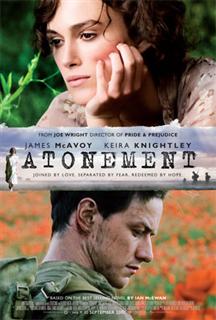 It’s not only a busy holiday season but a busy Oscar season as well, as most movies that are nominated for Oscars are usually released in the final two months of the calendar year. “Atonement”, directed by the man who brought us “Pride and Prejudice,” is a lushly filmed love story set against the backdrop of World War II and is one of those films that has the coveted “Oscar buzz.” Based on the critically-acclaimed novel by Ian McEwan, the movie is a tragic look at the way one childhood lie effectively wrecks several lives permanently.
It’s not only a busy holiday season but a busy Oscar season as well, as most movies that are nominated for Oscars are usually released in the final two months of the calendar year. “Atonement”, directed by the man who brought us “Pride and Prejudice,” is a lushly filmed love story set against the backdrop of World War II and is one of those films that has the coveted “Oscar buzz.” Based on the critically-acclaimed novel by Ian McEwan, the movie is a tragic look at the way one childhood lie effectively wrecks several lives permanently.
The opening scenes of “Atonement” are engaging, lyrical,and passionate (sounds of a typewriter are used to amazing effect as a musical overture) as the audience is introduced to the wealthy and tempestuous Talllis sisters – Cecilia (Keira Knightley) and her younger sister Briony- -who are wiling away their time on the Tallis estate untouched by rumors of war. Cecilia spends much of her time rebuffing the man she is obviously attracted to – Robbie, a lowly employee of the manor. Thirteen-year old Briony fills her time by sitting in her room making up stories about anything and everything. Passions collide one fateful night as Robbie and Cecilia give into their desires and Briony, jealous and confused by the couple’s relationship, chooses to make up a damaging story when another child goes missing.
“Atonement” elevates this immature mistake to the level of Shakepearean tragedy as Robbie is sent to jail and then to war, separating him from Cecilia. Cecilia breaks all ties with her family -especially Briony – and waits with longing for Robbie to return to her. As the story cuts back and forth through time, different versions of different events are given, and the audience only finds out the true story of what happens to these three characters at the very end of the film.
My problems with “Atonement” lie almost entirely in the second half of the film, when it switches to Robbie’s time at war and to Briony’s search as a young woman for forgiveness for her childish actions. Try as I might, I just couldn’t work up as much empathy as one would need to for Briony so “Atonement” never truly resonated with my soul in the way it was intended. Though there is the symbolism of Briony working in a hospital as a form of penance, and there is a confession of sorts at the end of the film, it becomes obvious that Briony continued to make cowardly choices in her adult life that only added to the suffering of herself and others. She wants reconciliation with her family and craves for mercy to cover her sins, but she doesn’t seem to grasp that the cost of receiving both will take great courage on her part.
I do understand why “Atonement ” is receiving so much critical praise. On the surface the movie is well-acted, clever, poetic ( the amazing five-plus minute steadicam scene of war-ravaged Dunkirk alone will get the movie an Oscar nom for cinematography), and ambitious in terms of its thematic ideas. However, I can’t quite forgive a movie that is essentially about love, loss and redemption for giving short-shrift to the spiritual elements of this tragic love triangle.


